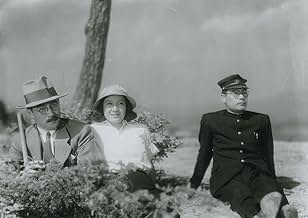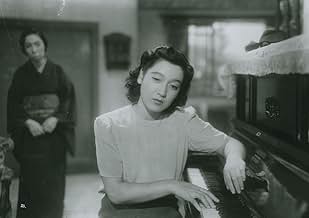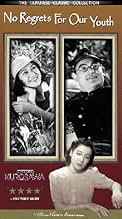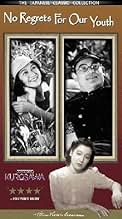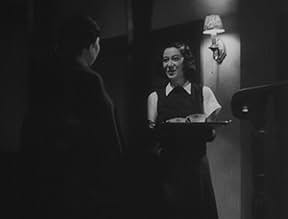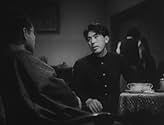Füge eine Handlung in deiner Sprache hinzuThe daughter of a politically disgraced university professor struggles to find a place for herself in love and life, in the uncertain world of Japan leading into WWII.The daughter of a politically disgraced university professor struggles to find a place for herself in love and life, in the uncertain world of Japan leading into WWII.The daughter of a politically disgraced university professor struggles to find a place for herself in love and life, in the uncertain world of Japan leading into WWII.
Empfohlene Bewertungen
Kurosawa's oeuvre is generally chided for being too male-focused, but in Yukie, his only female protagonist, he gives us one of his finest heroes. Her transformation over the course of the movie is brilliantly played by Setsuko Hara. Her mannerisms and expressions allow her character to age credibly, more so than other movies I can think of where the audience watches a character age over many years. Yukie is idealistic, but also practical and steadfast.
As a film, NO REGRETS is executed with flair: Kurosawa has yet to develop his own signature style fully at this point in his career. I found a lot of debt to Soviet and European art cinema on display here, especially in the montages. He is not yet the master filmmaker he would become, but this is an astonishing early effort, heartfelt and assured. But it would be a shame to only see this movie as a stepping stone towards better things, for it is a fine piece of work in its own right.
"No regrets for my youth" tells the story of the fight of some students against the militarist regime in Japan and their different destinies throughout the years, but the film focuses mainly on Yukie, that we see in the beginning, just as a spoilt girl, flirting with revolutionary games. She's very sensitive and soon notices how alienated from reality she is. The military government is slowly tightening its iron grip and silencing the opposition. Idealism has become dangerous in Japan.
Yukie now sees what's happening. She's very passionate in whatever she does. Yukie makes no compromises, but she's no fool either. The film will describe her journey - first, the fires of adolescence when the world seems to be out there just to fulfill her wishes, then self-awareness, fight, disillusion, suffering.... She and her friends will arrive to different conclusions and tread different roads.
In a way, "No regrets for my youth" is a coming of age film, in which politics, emotion and sex play an important role. Yukie wants to find her place in the world. She's not satisfied with her life and she's not satisfied with the world in which she's living. She wants to change them. "No regrets for my youth" shows how she tries to live up to her ideals.
In "No regrets for my youth" (as I said before) we feel the influence the Soviet (and Italian) masters had on Kurosawa. We see here a young Kurosawa - more spontaneous and enthusiastic (another Kurosawa film, more or less, along the same line is "Stray Dog" that takes place in post-war Japan). The camera is used effectively to show the landscape and people. The acting is more natural. We are spared the exaggerated gestures and movements that are seen in some of his later films. Setsuko Hara who plays Yukie is an extraordinary actress. She helps the film to achieve a truly great emotional depth. Highly recommended!
I was very impressed by how the film made the characters convincing in both the first act where they are college students, and then again nearly 10 years later. The characters have changed not only in appearance but in personality and mannerisms. It made the passing years very convincing.
The film is interesting from both an historical viewpoint and as a pure drama. This was made just a year or so after the Japanese surrender in World War II, and we get a good feel for how the militaristic government in Japan was able to gain the unquestioning support of most of the population. Some things never change, do they?
Highly recommended, although if you are starting out on Kurosawa, you may want to try something from the 1955 to 66 period.
Yukie is excited by Noge's political passion, and they begin an intense, inevitably short-lived affair. When Noge goes to prison, she becomes politically enlightened to Japan's oppressive state, and after he dies, she decides to take his ashes to his parents and stay with them to work the fields. She endures a great deal of hardship, both from his uncaring parents and neighbors, who harass the family of a "traitor". Against the odds, Yukie endures and triumphs and despite a brief sojourn back to Kyoto, realizes her life is far more fulfilling with the peasants. Much of the plot is rather convoluted and the storyline jumpy, as the politically motivated Kurosawa seems more interested in drawing certain emotional responses from the viewer. Clarity is only a secondary consideration here, as he busily applies much of the visual flair that he would exhibit with greater impact in his later masterworks like "Rashomon" and "Seven Samurai".
Even at this early stage in his directorial career (it's only his fifth film), there are a number of his stylistic touches evident - a series of quick freeze shots to illustrate Yukie's traumatized response behind a closed door to Noge's surprise departure; the use of a slow exposure camera that causes an unearthly (and sometimes irritating) blurring effect when people are in motion; people lying in a pastoral setting staring skywards (mimicked recently by Chinese filmmakers like Yimou Zhang); Yukie's oddly exaggerated, out-of-sync piano playing; and large crowds rushing down steps in an Eisenstein-like manner. However, the film gains real emotional heft toward the end when Yukie struggles in the rice fields with Noge's mother (played almost unrecognizably by another Ozu regular, Haruko Sugimura) under Yukie's mantra of the dead husband/son, "No regrets in my life, no regrets whatsoever". It's a moving sequence which brings the story to its resonant conclusion.
Proving why she was one of Japan's favorite post-WWII film stars, Hara is superb in showing Yukie's initial flightiness and evolving political consciousness. The other performances are reasonable but hardly as memorable - Susumu Fujita as Noge, Akitake Kono as Itokawa (whom Yukie rejects at the end as unworthy to know where Noge's grave is due likely to his pro-war stance) and Denjiro Okochi as Yukie's father. The combination of the illustrious Kurosawa and the incandescent Hara is certainly compelling enough to warrant viewing.
The title of the movie comes from Noge's statement to Yukie halfway through the film - she does not know he has continued his involvement in the anti-war movement, although he has spent time in prison and China for protesting. He tells her he has no regrets for any of his actions. Yukie doesn't quite understand until he is arrested and eventually killed for spying. Yukie has the option of returning home to her parents, but instead she finds Noge's parents and moves in with them. There she suffers hardship, sickness, and the humiliation of being known as an anti-war collaborator. The central question of the movie is why did she do this? Was she trying to "hold on" to a lost lover? Did she feel guilt over not having been more active in the anti-war movement? Was this her penance for a mis-spent youth? Even more perplexing is the way she rebukes Isokawa at the end of the film by refusing to show him Noge's grave - Isokawa had supported Japanese involvement in the war.
Perhaps the film is about the mind-state of Japan after losing the war - those who opposed the war, or who struggled through hardship to live normal lives, should value their actions in spite of the consequences. Those who supported the war deserve scorn and share in the responsibility of bloodshed.
Wusstest du schon
- WissenswertesFilming in 1946, just after the war, many of the cast and crew were living very poor lives, going hungry quite often. One of the actors recalled a personal story of his stomach growling during filming, causing the scene to have to be shot again.
- Zitate
Title Card: After the Manchurian Incident the militarists attempted to unify domestic opinions in order to realize their ambition to invade Asia. They denounced as "Red" any ideology that might hinder their policy. Professors and students fought the suppression. The Kyoto University Disturbance was one of their struggles for freedom.
- VerbindungenFeatured in The Pacific Century: Reinventing Japan (1992)
Top-Auswahl
- How long is No Regrets for Our Youth?Powered by Alexa
Details
- Laufzeit
- 1 Std. 50 Min.(110 min)
- Farbe
- Sound-Mix
- Seitenverhältnis
- 1.37 : 1

